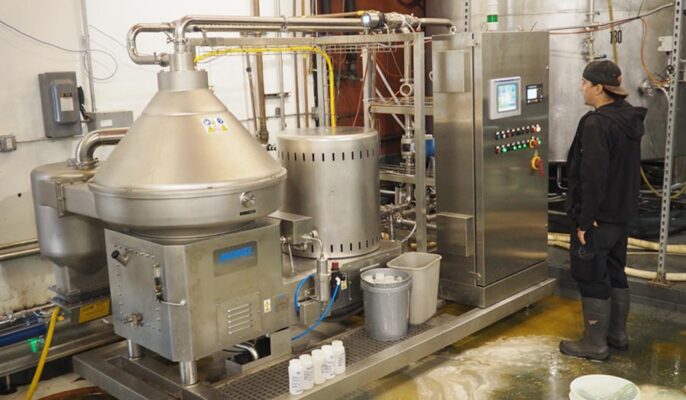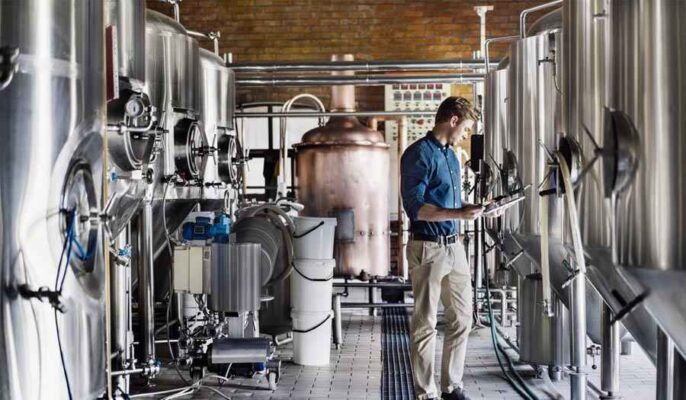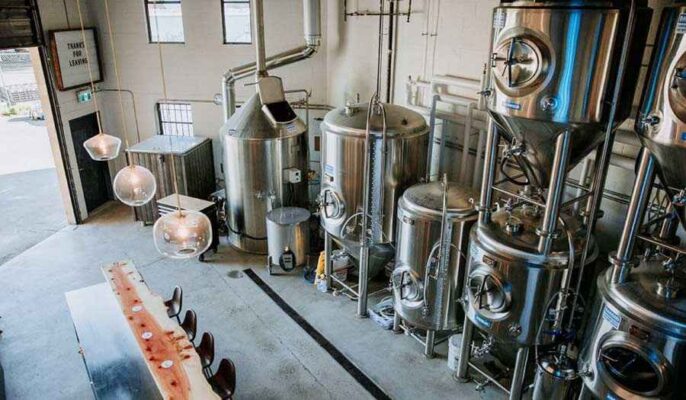A turnkey brewery is a pre-designed and pre-fabricated brewing system that is ready for immediate installation and operation. Turnkey breweries provide a fast and efficient way to get a brewery up and running compared to piecing together equipment yourself. In this comprehensive guide, we will cover everything you need to know about turnkey brewery equipment.
Overview of Turnkey Brewery Equipment
Turnkey breweries come as complete packaged systems with all the necessary equipment for beer production. This includes:
Brewing Equipment Guide
| Equipment | Description |
|---|---|
| Brewhouse | Contains the mash tun, lauter tun, brew kettle and whirlpool |
| Fermentation Tanks | Stainless steel vessels for primary and secondary fermentation |
| Brite Tanks | For clarifying, carbonating and storing finished beer |
| Piping | Interconnects all equipment for transfer of ingredients and beer |
| Control Panel | Centralized electrical and automation controls |
| Steam Boiler | Provides steam for heating operations |
| Chiller | Cools wort and maintains fermentation temperatures |
| CIP System | Automated cleaning-in-place equipment |
| Grain Handling | Mills, conveyors and silos for grain intake and management |
| Ingredient Dosing | Automatic hop dosing and yeast pitching |
The major advantage of turnkey systems is that everything is designed to work together seamlessly right out of the box. The brewhouse, fermenters, brite tanks, steam systems, controls and other equipment are all sized and integrated for your specific production goals and space requirements.
This avoids issues with piecing together undersized or incompatible components from different suppliers. Turnkey breweries are engineered for optimal workflow and quality control. They allow brewers to get up and running quickly and efficiently.

Applications and Uses of Turnkey Breweries
Turnkey brewing systems are used by a wide range of commercial brewery operations:
Turnkey Brewery Applications
| User | Reasons for Using |
|---|---|
| Startup Breweries | Fast setup, lower capital costs |
| Nano Breweries | Optimized small footprint |
| Micro Breweries | Efficient standardized system |
| Regional Breweries | Scalable capacity |
| Brewpubs | Integrated brewhouse design |
| Contract Brewers | Flexible equipment sizing |
Here are some of the top reasons turnkey breweries are preferred:
- Speed – Turnkey systems allow much faster setup compared to sourcing all the equipment yourself. Avoid lengthy build times, delays and coordination issues.
- Cost – Pre-engineered systems can cost 20-30% less than custom builds. Benefit from economies of scale.
- Quality – Turnkeys undergo rigorous factory testing and have validated designs for optimal performance.
- Simplicity – With a turnkey there is one point of contact for the entire system. Makes deployment hassle-free.
- Flexibility – Many turnkey suppliers offer a range of brew house sizes and customizable options.
- Technology – Turnkeys often feature automated controls and innovations not found in traditional custom builds.
In summary, turnkey breweries are used by startups and established brewers alike to maximize productivity and beer quality while minimizing costs and engineering challenges.
Specifications of Turnkey Brewing Systems
Turnkey breweries are available in a wide range of production capacities and configurations:
Turnkey Brewery Specifications
| Parameter | Typical Range |
|---|---|
| Batch Sizes | 1 BBL to 30 BBL |
| Annual Production | 500 BBL to 150,000 BBL |
| Brewhouse Size | 3 BBL to 60 BBL |
| Fermenter Volume | 3 BBL to 600 BBL |
| Power Requirements | 20 kW to 1500 kW |
| Steam Boiler Size | 20 HP to 150 HP |
| Compressed Air | 5-15 CFM at 100 PSI |
| Digital Controls | PLC or PC-based |
| Construction | Stainless Steel 304, 316L |
| Electrical Standards | NEC, UL, CSA, CE |
| Automation | Level from manual to fully automated |
Some additional design considerations for turnkey breweries include:
- Floor space and ceiling height required
- Workflow between brewhouse, fermentation, and packaging
- Grain storage and milling logistics
- Ingredient handling needs
- Cooling and wastewater requirements
- Quality control points
- Electrical, steam and utility connections
- Local inspection and permitting regulations
Careful planning of specifications and layout early on will ensure your turnkey brewery is optimized for your goals and site conditions.
Choosing a Turnkey Brewery Supplier
Selecting the right turnkey supplier is key to getting a high-quality brew house system. Here is a guide to evaluating providers:
How to Choose a Turnkey Supplier
| Factor | What to Look For |
|---|---|
| Reputation | Proven track record, client references |
| Experience | Years in business, number of systems installed |
| Offerings | Range of system sizes and options |
| Customization | Ability to modify standard systems |
| Design Services | On staff engineers and drafters |
| Manufacturing | Use of quality materials and methods |
| Testing | Validation of designs and rigorous factory testing |
| Shipping | Capabilities for delivery and installation |
| Support | Warranty, training, manuals and troubleshooting |
| Standards | Certifications like UL/ETL, ISO 9001, etc. |
| Location | Consider travel costs and support proximity |
Reputable turnkey suppliers will provide 3D drawings of the brewery layout for approval prior to manufacturing. Be sure to get multiple quotes and compare pricing on both equipment and shipping costs. Also factor in after-sales support and ease of working with the provider.

Turnkey Brewery Pricing
Turnkey brewing systems range in price from around $100,000 up $5 million or more:
Turnkey Brewery Pricing
| System Size | Turnkey Price Range |
|---|---|
| 1 BBL Brewpub | $100,000 – $250,000 |
| 3 BBL Micro | $250,000 – $500,000 |
| 7 BBL Pub | $450,000 – $750,000 |
| 10 BBL Production | $600,000 – $1,200,000 |
| 20 BBL Regional | $1.5 million – $3 million |
| 30 BBL Packaging | $2.5 million – $5 million |
Pricing depends on several factors:
- Brewhouse size and capacity
- Number and size of fermentation and brite tanks
- Manual vs automated controls and labor-saving equipment
- Grain handling systems
- Additional equipment like CIP systems, CO2 recovery, heat exchangers, etc.
- Shipping and installation costs
- Import taxes and duties (if sourced overseas)
Get detailed quotes from at least 3 suppliers. Look for discounts on bulk purchases of multiple systems. Many turnkey companies also offer leasing options to spread out upfront capital costs over time.
Installation, Operation and Maintenance
Another benefit of turnkey brewing systems is that installation and start-up is handled by the supplier’s experts. Here is an overview:
Turnkey Brewery Installation & Operation
| Task | Description |
|---|---|
| Site Prep | Flooring, drainage, utilities to equipment spec |
| Delivery | Coordination of shipping and unloading |
| Positioning | Location per layout drawings |
| Installation | Assembly, piping, wiring connections |
| Inspections | Local building and electrical inspections |
| Commissioning | Initial water testing, calibrations, start-up |
| Training | Equipment operation and safety |
| Support | Troubleshooting and maintenance assistance |
| Documentation | Manuals, schematics, parts lists |
While turnkey suppliers handle the initial deployment, the brewery staff take over day-to-day operation and maintenance. Ongoing tasks include:
- Monitoring brewing process parameters
- Executing cleaning and sanitization procedures
- Performing preventative maintenance on pumps, valves, sensors
- Tracking fermentation progress with gravity measurements
- Maintaining grain milling equipment and conveyors
- Checking steam boiler water treatment and blowdowns
- Scheduling chilling unit service and refrigerant top-offs
- Calibrating instruments and replacing worn parts
- Testing for microbiological quality control
- Managing brewing chemicals, lubricants, gases, etc.
With a focus on maintenance, turnkey brewing systems can reliably produce quality beer for decades. Upgrade modules are also available from suppliers as production needs change.
Turnkey Brewing Pros and Cons
Like any solution, there are both advantages and limitations to consider with turnkey brewery equipment:
Turnkey Brewery Pros & Cons
| Pros | Cons |
|---|---|
| Rapid deployment | Less customization potential |
| Validated designs | Generally smaller systems only |
| Optimized workflow | Limitations based on pre-set specs |
| Newest technology | Less flexibility vs fully custom |
| Expert installation assistance | Additional costs for modifications |
| Lower upfront capital costs | May still require building upgrades |
| Potential discounts for multiple units | Best for less complex operations |
| Easier financing and leasing | Dependent on supplier for support |
| Less building infrastructure needed | Can underestimate utility requirements |
| Less permitting and compliance burden | May still need consultant oversight |
Overall, turnkey breweries excel at fast-tracking brewery startups so owners can focus their time and resources on making great beer and building their brand. For larger or more complex breweries, a custom-designed system may be required.

FAQs
Here are answers to some frequently asked questions about purchasing turnkey brewery equipment:
Turnkey Brewery FAQs
| Question | Answer |
|---|---|
| What turnkey sizes are best for a new microbrewery? | For a new microbrewery, a 3-7 BBL brewhouse is typical. This scales well from a brewpub up to distributing regionally. |
| What are the latest innovations in turnkey technology? | Some newer turnkey innovations include automated hop dosing, integrated heating and cooling, and cloud-based monitoring and control powered by AI and machine learning algorithms. |
| Can I get a turnkey brewery customized to my recipes? | Most turnkey suppliers offer at least some customization options, such as different fermenter configurations tuned to your beer styles. Discuss special recipe needs upfront. |
| What are typical lead times for turnkey breweries? | Lead times run 10-16 weeks currently. Order early to avoid extra delays. |
| How much space is needed for a turnkey brewhouse? | As a rule of thumb, plan on 2 sq ft per BBL capacity, so a 10 BBL brewhouse would need about 2000 sq ft. Double this for the full brewery. |
| Do turnkeys require less permitting paperwork? | Turnkeys still require local building and electrical permits like any brewery build. However, the validated designs can simplify planning approvals. |
| What are trusted turnkey brewery equipment brands? | Some of top turnkey suppliers are Specific Mechanical, AAA Metal Fabrication, JVNW, Stout Tanks, Premier Stainless and Brewmation. |
Careful planning and selection of your turnkey brewery supplier will help ensure your new brewing system meets your specific needs and budget and gets your brewery operating quickly and smoothly.
Conclusion
We have covered all the key considerations in choosing turnkey brewery equipment – from sizing and specs to installation and operation. Turnkey systems provide an efficient, cost-effective way to establish both small and large-scale breweries. With careful upfront planning and selection of an established turnkey supplier, brewers can have their operations up and running rapidly while focusing resources on producing great craft beer.




